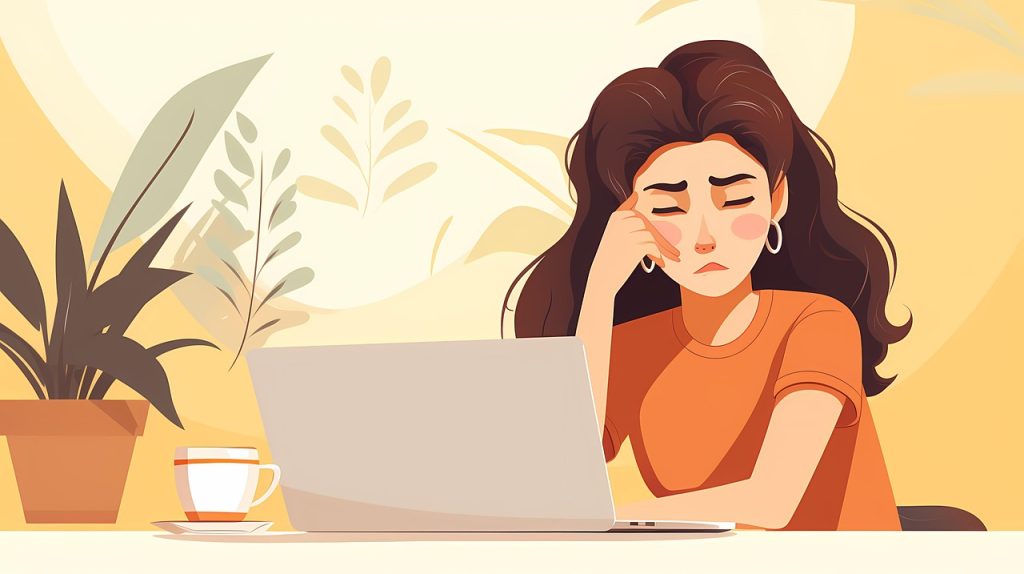- 1、 First, Understand: What’s the Core Difference Between “Aloof” and “Depressed” in Dorm Life?
- 2、 True Stories: Depression Hidden by the “Aloof” Label, Festering Quietly in the Dorm
- 3、Key Points: 4 Clues to Quickly Tell If a Dormmate Is “Aloof” or “Depressed”
- 4、 If They Might Be Depressed: 3 Friendly, Boundary-Respecting Ways Dormmates Can Help
- 5、 Conclusion: Don’t Let the “Aloof” Label Blind You to Those Around You
- 6、References
- 7、Disclaimer
“They always eat and go to class alone, even stay in the dorm on weekends—they must think they’re better than everyone else, right?” “Every time I try to talk to them, they respond coldly. They’re just hard to get along with”—on college campuses, many dormmates who keep to themselves are labeled as “aloof” or “unsociable.” But few realize that behind this inability to fit in may lie hidden signs of depression.
Data from the U.S. National Institute of Mental Health (NIMH) shows that the prevalence of depression among college students aged 18-24 is approximately 15.6%. Over 40% of these patients hide their emotional pain through “social withdrawal,” which is often mistaken for “being aloof.” As someone who once volunteered at a university mental health center, I’ve seen too many regrets caused by such misunderstandings: some people deliberately distance themselves from classmates, mistaking their depression signs for “aloofness,” only to regret it when the person harms themselves; others feel more depressed because their alone time is misinterpreted as unfriendliness. In fact, by focusing on 4 key clues, you can tell whether a dormmate’s “solitude” is a matter of personality or a cry for help from depression.

First, Understand: What’s the Core Difference Between “Aloof” and “Depressed” in Dorm Life?
Many people equate “not initiating social interaction” with “aloofness,” but they overlook the fundamental difference between “active choice” and “passive avoidance.” Combining NIMH’s diagnostic criteria for “impaired social functioning” in depression and common dorm life scenarios, I’ve summarized two key comparisons:
1. Attitude Toward “Solitude”: Enjoyment vs. Suffering
Truly aloof classmates tend to be relaxed and fulfilled when alone—for example, they might focus on reading or doing crafts in the dorm, stay in their own rhythm even when roommates are chatting lively, and occasionally share their hobbies (e.g., “This magazine has a really interesting article”).
In contrast, depressed classmates experience solitude as a “forced avoidance”: they might sit at their desk staring blankly at the screen, flipping through textbooks without absorbing anything; when roommates invite them to the cafeteria, they’ll make excuses like “I’m not hungry” or “I have things to do,” then end up eating bread in the dorm; even if dragged into social situations, they’ll stay tense the whole time, their eyes wandering, and rush back to the dorm immediately after—sometimes even having emotional breakdowns.
Lena (pseudonym), a 22-year-old student at Cornell University, once said in an interview: “During that period, I pretended to be ‘studying’ in the dorm every day, but in reality, I just spread my books out and stared at the words without seeing them. My roommates thought I ‘didn’t socialize because I loved studying,’ but no one knew I was afraid of saying the wrong thing or having others notice my bad state.”
2. Reaction to “Disturbance”: Polite Refusal vs. Oversensitivity
Aloof classmates respond to disturbances in a clear and polite way—for instance, if a roommate plays music loudly late at night, they’ll say “Excuse me, I have an early class tomorrow. Could you turn it down a bit?” without anger or resentment.
However, depressed classmates are more sensitive to “disturbances,” even overreacting: they might suddenly fall silent for a long time if a roommate accidentally knocks over their pen; a casual comment like “You seem a bit down lately” could make their eyes tear up instantly, but they’ll quickly cover it up, saying “No, I just didn’t sleep well.” This oversensitivity is essentially a decline in emotional regulation caused by depression, not “a bad temper.”
True Stories: Depression Hidden by the “Aloof” Label, Festering Quietly in the Dorm
Story 1: “They Always Stayed Alone—We All Thought They Looked Down on Us”
In 2022, Noah (pseudonym), a freshman at the University of California, Berkeley, became the “outsider” in his dorm as soon as he enrolled: he left early and returned late every day, never joined his roommates’ late-night snack runs, sat alone in the back row in class, and only replied with “Hmm” or “Okay” when others added him on WeChat. His roommates whispered among themselves, “He must think he’s better than us because he has good grades,” and gradually stopped trying to talk to him.
It wasn’t until the end of the semester, when Noah was hospitalized for overdosing on sleeping pills, that his roommates learned from the counselor that he had been diagnosed with depression for half a year. It turned out that Noah had suffered from psychological trauma due to school bullying in high school. When he first entered college, he wanted to make friends but was afraid of “being bullied again,” so he disguised himself as “aloof.” Later, as his depression worsened, he even struggled to get out of bed and eat, let alone gather the courage to socialize. Only then did his roommates recall the messy desk (they had thought he was “sloppy,” but in reality, he lacked the energy to clean up) and the suppressed coughing sounds at night (which were actually him crying quietly)—these details, mistaken for “aloofness,” were all signs of depression.
Story 2: “From ‘Chatty’ to ‘Silent’—We Thought They Just Became Aloof”
Sofia (pseudonym), a student at Northwestern University, was very outgoing as a freshman: she often shared her hometown food with roommates and watched dramas with them. But starting from the second half of her sophomore year, she suddenly became silent: she no longer joined conversations voluntarily, stayed in the dorm all weekend with the curtains drawn, and even skipped some major classes occasionally. Her roommates thought, “She’s probably in a relationship, so she doesn’t have time for us” or “Maybe she just doesn’t have common topics with us anymore,” and no one asked why.
It wasn’t until Sofia’s mother came to the school, found that she had lost more than 20 pounds and hidden antidepressants under her pillow, that they learned she had been diagnosed with severe depression for 2 months. Sofia later wrote in her diary: “I actually wanted to tell my roommates ‘I’m having a hard time,’ but every time the words reached my lips, I swallowed them back—I was afraid they’d think I was overreacting, afraid they’d avoid me from then on.”
NIMH researchers analyzing such campus cases point out that dorms, as the closest living environment for college students, make it easiest to notice subtle changes in classmates. However, the label of “aloofness” often makes people ignore these “distress signals.” Statistics show that 62% of college students with depression report “showing abnormal signs in the dorm that were not noticed by roommates.”
Key Points: 4 Clues to Quickly Tell If a Dormmate Is “Aloof” or “Depressed”
Combining NIMH’s clinical observation standards and dorm life scenarios, I’ve summarized 4 practical clues. Even for less familiar classmates, you can judge by daily observations:
Clue 1: Observe “Life Routine”—”Structured Solitude” vs. “Chaotic Avoidance”
Aloof classmates have a structured routine when alone: they might go to the library at a fixed time every day, tidy their desk and go to bed on time after returning to the dorm, and keep their personal items organized. Even without socializing, they can manage their lives well.
Depressed classmates, however, often have “chaotic lives” when alone: they might go days without changing clothes or making their beds, with takeout boxes piling up in the corner of their desk; they are often late for or absent from classes, but instead of doing things they enjoy, they “lie around” in the dorm; when asked about their recent situation, they only say “I’m fine” or “Nothing much,” avoiding eye contact.
Clue 2: Notice “Mood Swings”—”Stable Detachment” vs. “Unpredictable Moods”
Aloof classmates usually have stable moods: they don’t suddenly feel happy or sad over small things, and they respond appropriately to roommates’ joys and sorrows (e.g., saying “Congratulations” when a roommate wins an award)—neither overly enthusiastic nor overly cold.
Depressed classmates have “unpredictable moods”: they might chat with you one day and say nothing the next; they might laugh along with a funny video, but the smile fades quickly; occasionally, they might lose their temper suddenly, then apologize guiltily afterward, saying “I’m sorry, I didn’t mean to.”
Clue 3: Check “Reaction to Interests”—”Lack of Interest” vs. “Inability to Participate”
Aloof classmates directly refuse things they don’t like but actively engage in things they enjoy: for example, they might not join conversations about celebrity gossip but will take the initiative to share their photos and ideas if the topic turns to their favorite hobby, photography.
Depressed classmates, on the other hand, “can’t bring themselves to participate in anything”: whether it’s a conversation about a game they used to like or an invitation to a club activity they once enjoyed, they’ll make excuses to refuse, saying “I’m not interested” or “I don’t want to go.” However, their eyes show disappointment rather than disgust.
Clue 4: Look for “Physical Signs”—”Healthy Detachment” vs. “Exhaustion and Lethargy”
Even without much socializing, aloof classmates are in good physical condition: they have a ruddy complexion, walk with energy, eat and sleep normally, and show no obvious weight changes or listlessness.
Depressed classmates have obvious signs of “physical exhaustion”: they look pale with heavy dark circles, walk with a hunched back; they either lose their appetite (eating only one meal a day) or overeat (stocking up on snacks but having no appetite to eat them); they often say “I have no energy” or “I don’t feel well,” but medical checks show no problems.

If They Might Be Depressed: 3 Friendly, Boundary-Respecting Ways Dormmates Can Help
Many people want to help depressed classmates but are afraid of “saying the wrong thing” or “crossing boundaries,” which might make the person more resistant. Combining NIMH’s “peer support recommendations” and real campus scenarios, here are 3 safe and effective methods:
1. Use “Low-Pressure Care” Instead of “Overly Intrusive Questions”
Don’t directly ask “Are you depressed?” or “Why are you always unhappy?”—this will put pressure on them. Instead, show care in a relaxed way, such as: “I bought an extra cup of milk tea—do you want to try it?” “The library is not crowded today—want to go together?” If they refuse, don’t press further; just say “It’s okay, let me know if you want to go later.”
Research from Stanford University’s Mental Health Center shows that “low-pressure care” is more effective than “deliberate help” for people with depression. As Noah’s roommates later reflected: “If we hadn’t kept saying ‘Why don’t you hang out with us?’ but instead occasionally shared some snacks with him, maybe he wouldn’t have felt so lonely.”
2. Bridge the Gap Through “Small Shared Tasks”—Don’t Force Socializing
Find low-pressure shared activities, such as: “I’m going to the supermarket—do you need me to pick up anything?” “This variety show is funny—want to watch a few minutes together?” These small tasks don’t require much conversation but can make them feel “accepted” rather than “isolated.”
It’s important not to force them into group social events (like dorm dinners or club activities). If they clearly refuse, respect their choice. Don’t say things like “It’s not good for you to stay alone all the time” or “You just need to socialize more”—these words will make them feel “their state is being denied.”
3. When Seeing Warning Signs, Contact Professionals Promptly
If you notice signs of self-harm (e.g., saying “Life is meaningless” or “I’m so tired,” or having scratches on their arms), or if they stay in the dorm for days without going out or eating, don’t handle it alone. Contact the counselor, the school’s mental health center, or their family immediately.
NIMH emphasizes that the core of peer support is “companionship and guidance,” not “solving the problem.” You don’t need to be a “psychologist”—just letting them know “someone cares about you, and you’re not alone” is the greatest help you can provide.
Conclusion: Don’t Let the “Aloof” Label Blind You to Those Around You
In the small community of a dorm, “keeping to oneself” is never a sign of being an “outsider”—some people enjoy the freedom of solitude, while others suffer from depression in their aloneness. More often than not, what we perceive as “aloofness” may just be someone putting up a “protective shell” with all their strength in a difficult situation.
NIMH research shows that timely peer support can increase the recovery rate of college students with depression by 30%. A casual word of care or a warm look from you might be the courage they need to step out of the darkness. Next time you see a classmate keeping to themselves in the dorm, try to observe more and judge less—what you see as “aloofness” may be exactly the “distress signal” they need others to notice.
References
National Institute of Mental Health (NIMH). Depression Topic Page. https://www.nimh.nih.gov/health/topics/depression
National Institute of Mental Health (NIMH). Recognition and Response to Depression in College Students. https://www.nimh.nih.gov/research/research-conducted-at-nimh/college-student-depression
Journal of American College Health. “The Link Between Dorm Social Isolation and Depression.” March 2023. https://www.journalofcollegehealth.org/article/S0022-4871(22)00478-8/fulltext
Stanford University Mental Health Center. “The Role of Peer Support in College Student Depression Intervention.” November 2022. https://med.stanford.edu/psychiatry/divisions/child-adolescent/education-training/peer-support.html
National Institute of Mental Health (NIMH). Copyright Policy. https://www.nimh.nih.gov/site-info/policies#part_2718
Disclaimer
Part of the data and content in this article is sourced from the U.S. National Institute of Mental Health (NIMH) official website and public academic reports (see References for details). The text has been used in compliance with NIMH’s copyright policy, with no misleading modifications to the original meaning and no use of images from its website.
The identification methods and peer support suggestions mentioned in this article are for popular science reference only and do not constitute any medical advice, diagnosis, or treatment plan.
The external links included in this article are valid and relevant to the content, but the accuracy, completeness, and timeliness of the linked webpage content are not guaranteed.
If you or someone around you has related health issues, please consult a qualified doctor or legitimate medical institution and follow professional guidance for evaluation and intervention.







Discuss